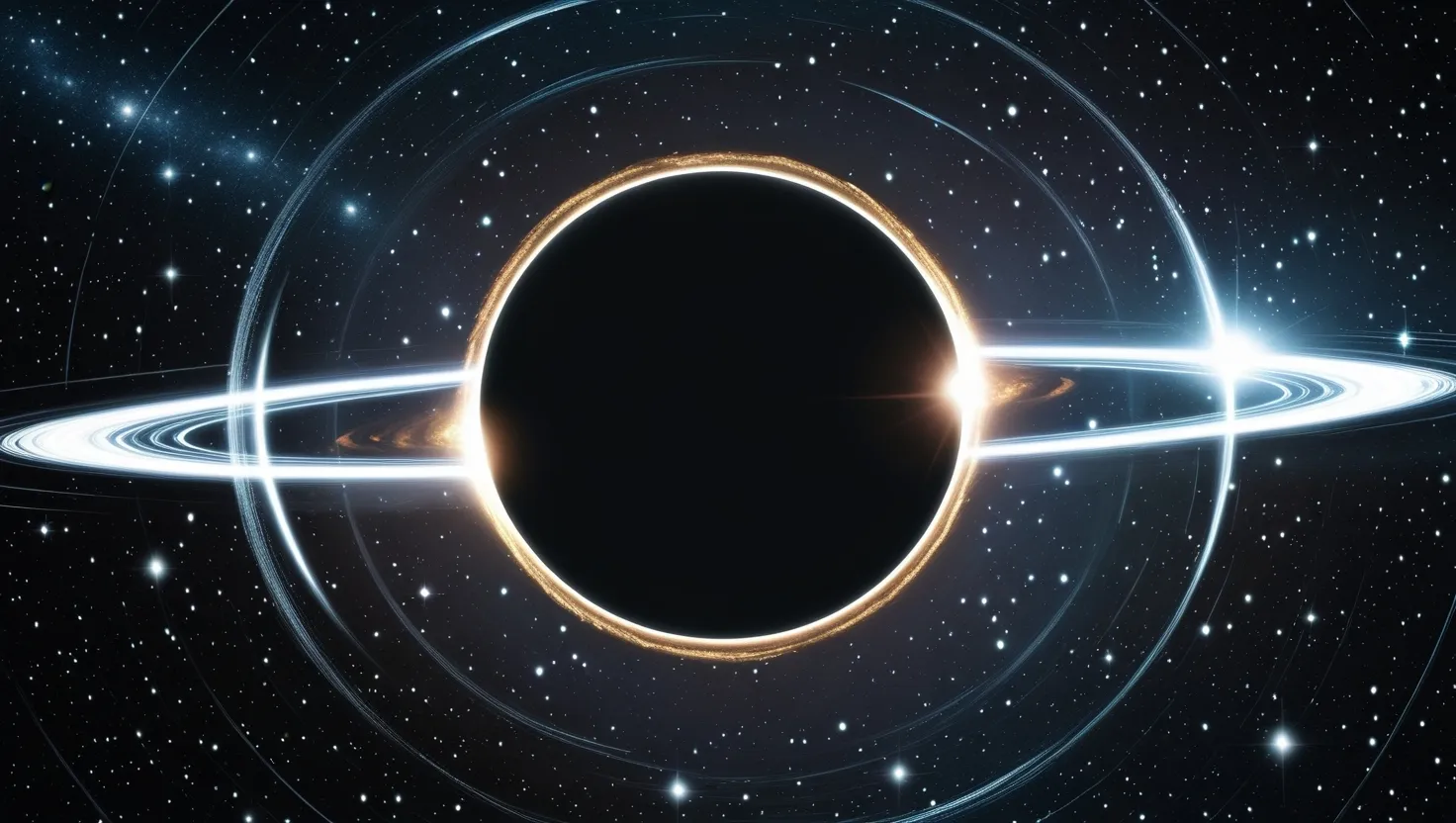The Puzzles That Keep Physicists Awake at Night
Black holes are some of the strangest things in the cosmos. They’re so dense that not even light can escape them. But here’s the weird part: we still don’t fully understand how they work. I want to walk you through five major mysteries that have stumped the brightest minds in physics for decades. These aren’t just abstract problems. They represent real gaps in how we understand reality itself.
When we think about black holes, most of us imagine cosmic vacuum cleaners sucking everything into oblivion. But the reality is far more complicated and fascinating. Every black hole presents a puzzle box that challenges everything we think we know about how the universe operates. Let me take you on a journey through these mysteries, explaining what makes each one so difficult to solve.
The Information Problem That Breaks Physics
Imagine you threw a book into a black hole. What happens to the information inside that book? This is not just a philosophical question. It’s an actual crisis in modern physics that forces two of our most important theories to clash directly.
Here’s the problem in simple terms. Quantum mechanics—the rules that govern tiny particles—says information can never truly disappear from the universe. It can change form, scatter, mix around, but it can’t vanish completely. This is called conservation of information, and it’s fundamental to how we think quantum physics works.
General relativity, on the other hand, tells us that black holes have something called an event horizon. Beyond this boundary, nothing escapes. Not light, not matter, nothing. If something falls past this point, it’s gone from our universe forever. According to relativity, the information gets lost.
For decades, physicists scratched their heads wondering which theory was wrong. Stephen Hawking eventually discovered that black holes aren’t completely black. They emit radiation. But here’s the catch: this radiation appears completely random. It doesn’t seem to carry any information about what fell into the hole. So if a black hole eventually evaporates completely, all that information really does seem to vanish.
This is what physicists call the black hole information paradox, and it’s still unsolved. Some scientists argue Hawking was wrong about the radiation being random. Others suggest the information somehow gets encoded in the radiation in ways we haven’t figured out yet. A few even think information might escape through a different mechanism we haven’t discovered. Each possibility requires rethinking something fundamental about physics.
“Science is a process of exploring, which is always partial. We explore, and we find out things that we understand. We find out things we thought we understood were wrong. That’s how it makes progress.” — Freeman Dyson
The Singularity Breakdown
At the center of every black hole lies something called a singularity. Imagine squeezing all the mass of a star—something that would normally be millions of kilometers across—down into an infinitely small point. That’s what mathematics tells us happens at the center of a black hole.
But here’s where things get really strange. When physicists actually do the math, the equations start giving them answers that make no sense. The density becomes infinite. Time behaves impossibly. The equations basically wave their hands and give up.
This is a mathematical way of saying our understanding breaks down completely. We don’t have a theory that can describe what happens at a singularity. General relativity, which works beautifully for describing the space around black holes, simply fails when you try to apply it to the singularity itself.
Why does this matter? Because singularities represent the extreme point where gravity is so strong that it completely dominates everything else. Understanding what happens there could tell us something profound about how reality works at its most extreme. Some physicists think the singularity might not actually be infinitely dense. Maybe there’s something about the very nature of spacetime that prevents infinities from actually existing. Maybe at tiny enough scales, quantum effects take over and prevent the infinite density we calculate. But we don’t know yet.
Think about it this way: before we understood atoms, we thought matter could be divided infinitely. But it can’t—there’s a smallest unit. Maybe there’s something similar happening with spacetime that we simply haven’t discovered yet. The singularity might be telling us we need a completely new theory of physics.
Hawking Radiation: The Ghost We’ve Never Caught
In 1974, Stephen Hawking made a shocking prediction. Black holes, he said, aren’t completely black. They actually emit radiation. This was revolutionary because it suggested black holes could evaporate over time. It meant black holes were more like thermodynamic objects—things with temperature and entropy—rather than simply cosmic trash disposals.
But here’s the problem: we’ve never actually detected this radiation. Not once.
Why is that so strange? Because if the prediction is correct, it should be happening everywhere. Every black hole in the universe should be slowly losing energy through this radiation. Yet despite decades of searching with increasingly sophisticated instruments, we haven’t caught a single photon from Hawking radiation.
There are several reasons why detection is so difficult. Black holes in the universe are surrounded by matter and radiation from their environment, making it nearly impossible to isolate their own radiation. The radiation is incredibly faint. Additionally, only very small black holes would emit noticeable amounts of radiation, and detecting such tiny black holes is enormously challenging.
Some physicists wonder if the radiation really exists at all. Others think we simply haven’t built the right tools to measure it. Still others suggest that maybe our understanding of how black holes emit radiation is incomplete. Perhaps there are mechanisms besides what Hawking described that could produce radiation, or maybe the radiation takes forms we haven’t considered.
This uncertainty matters because Hawking radiation is central to several ideas physicists have about black holes. Without confirming it actually happens, we can’t be sure those ideas are correct. It’s like having a recipe that makes perfect sense on paper, but you’ve never actually cooked it to verify it works.
“The whole point of science is that most of it is uncertain. That’s why science is exciting—because we don’t know.” — Freeman Dyson
The Event Horizon: Where Physics Gets Weird
The event horizon is the boundary around a black hole. Cross it, and escape becomes impossible. Light itself cannot move fast enough to get back out. It’s like a cosmic point of no return.
But what exactly is happening at that boundary? That’s where things get genuinely puzzling.
According to general relativity, crossing the event horizon shouldn’t feel particularly special if the black hole is large enough. If you were falling into a supermassive black hole—the kind that lives at the center of galaxies—you might not notice anything extraordinary as you crossed the event horizon. You’d only get torn apart by tidal forces much later as you approached the center.
Yet quantum mechanics suggests something very different should happen. When you apply quantum theory to what happens at an event horizon, you get results suggesting that crossing should involve enormous energies and effects. Some physicists have proposed there might be a “firewall” of energy at the event horizon that would instantly destroy anything crossing it.
These two descriptions can’t both be true. Either you pass through smoothly, or you get obliterated. Which one is it?
This discrepancy is called the black hole firewall paradox, and it points to something fundamentally wrong with how we’re thinking about black holes. Either general relativity breaks down at the event horizon in ways we don’t understand, or quantum mechanics doesn’t work the way we thought near such extreme gravity. Or maybe both theories need adjustment.
The event horizon is also strange because of something called the holographic principle. Some physicists believe that all the information about what falls into a black hole gets scrambled and encoded on the event horizon surface. If true, this would mean black holes aren’t really destroying information—they’re just storing it in a way we don’t yet understand. But we have no idea if this is actually what happens.
Formation and Growth: Where Do They Come From?
We still don’t fully understand how black holes form or grow. This might sound surprising—don’t we know black holes form when massive stars collapse? We do, mostly. But the details are murky, and they get much murkier when you consider the huge black holes at the centers of galaxies.
When a massive star dies, it can collapse into a black hole. This process is understood reasonably well. But here’s the puzzle: galaxies contain black holes millions or billions of times the mass of our sun. How did they get so massive?
The problem is one of time. According to our calculations, black holes can’t grow fast enough through normal means—swallowing nearby matter and merging with other black holes—to reach such enormous sizes in the time available since the universe began. Some other process must be accelerating their growth, but we don’t know what it is.
Could black holes grow more efficiently than we think? Could they consume matter faster than our models predict? Could they merge with other black holes more frequently? Could there be multiple pathways to forming massive black holes that we haven’t identified?
Recent observations have made this puzzle even more difficult. Telescope images have shown us that even in the early universe, when it was very young, there were already black holes nearly as massive as the oldest ones we see today. This suggests either black holes grew much faster than we thought possible, or there’s something fundamentally wrong with our understanding of how they form.
“Nature’s imagination is always richer than ours.” — Freeman Dyson
When scientists look at actual images from advanced telescopes, they see the shadows of black holes—areas where light cannot escape. These images are spectacular achievements in observation. But even with this visual confirmation that black holes exist and behave somewhat as we expect, the fundamental questions remain. What we’re seeing is just the shadow. The real mysteries lurk in the physics happening in those dark regions where our theories fail.
The genuine challenge facing physicists is that black holes force us to confront the limits of our understanding. They’re laboratories for testing the most extreme physics possible. Every unsolved mystery about black holes is really telling us that somewhere in our theories—whether it’s general relativity, quantum mechanics, or both—something needs to change.
Have you ever wondered what would actually happen if you fell into one? Or whether information really does disappear forever? These aren’t just idle questions. They’re questions that physicists spend their entire careers trying to answer, because the answers might reshape everything we know about reality. That’s what makes black holes so fascinating. They’re not just cosmic curiosities. They’re the keys to understanding the deepest truths about how our universe actually works.






